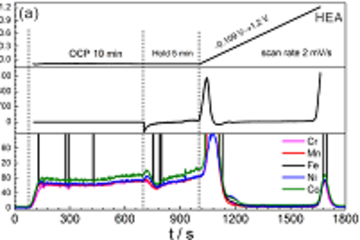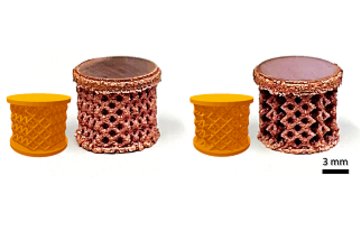All genres
1.
Journal Article
Suppression of Cr nanoclusters and enrichments in Fe–Cr based alloys with cryogenic processing for future energy sector. Journal of Materials Research and Technology 36, pp. 9262 - 9273 (2025)
2.
Journal Article
Investigation of selective oxidation during cooling of hot-rolled iron-manganese-silicon alloys. Corrosion Science 186, 109466 (2021)
3.
Journal Article
Stable and Active Oxygen Reduction Catalysts with Reduced Noble Metal Loadings through Potential Triggered Support Passivation. ChemElectroChem 7 (11), pp. 2404 - 2409 (2020)
4.
Journal Article
Early stages of oxidation observed by in situ thermogravimetry in low pressure atmospheres. Corrosion Science 86, pp. 183 - 188 (2014)
5.
Journal Article
Thermogravimetry and insitu mass spectrometry at high temperatures compared to theoretical modelling - The weight loss during selective decarburisation at 800 °C. Corrosion Science 78, pp. 188 - 192 (2014)
6.
Journal Article
A novel laboratory set-up for investigating surface and interface reactions during short term annealing cycles at high temperatures. Review of Scientific Instruments 84, 085108 (2013)
7.
Journal Article
Corrosion behaviour of Fe–Al(–Ti) alloys in steam. Intermetallics 18 (7), pp. 1375 - 1378 (2010)
8.
Talk
Internal oxidation of high strength steels during short-term annealing: Observation of unexpectedly fast progress of the internal oxidation and first tentative model. EFC Workshop High Temperature Corrosion, Frankfurt, Germany (2015)
9.
Talk
Suppressing the selective oxidation during the recrystallization annealing of steel band for improved hot dip galvanizing: Laboratory study. ISHOC2014 - International Symposium on High-temperature Oxidation and Corrosion 2014, Hakodate, Hokkaido Japan (2014)
10.
Talk
Investigation of the Fundamental Processes in the Internal Oxidation of Binary and Ternary Iron Based Alloys at Elevated Temperatures. 2014 ECS and SMEQ Joint Internat. Meeting, Cancun, Mexico (2014)
11.
Talk
Facing New Challenges for High Temperature Processes. 224th ECS Meeting , San Francisco, CA, USA (2013)
12.
Talk
Main Scale formation of Fe-Al based model alloys in steam. International Symposium on High-temperature Oxidation and Corrosion, Zushi, Japan (2010)
13.
Poster
The investigation of the internal oxidation during short-term annealing in binary and ternary alloys. Gordon Research Conference on High Temperature Corrosion, New London, NH, USA (2015)
14.
Poster
The investigation of the internal oxidation during midterm-term annealing in binary and ternary alloys. Gordon Research Conference on High Temperature Corrosion, New London, NH, USA (2015)
15.
Poster
High Temperature Corrosion in low-activity gases - Theoretical Calculations and Experimental Comparison of Oxide, Nitride and Carbide Formation. Gordon Research Seminar on High Temperature Corrosion, New London, CT, USA (2013)
16.
Poster
An experimental set-up for in-situ thermogravimetry in low pressure environments. Gordon Research Seminar on High Temperature Corrosion, New London, CT, USA (2013)
17.
Poster
Internal Oxidation in Iron Bases Model alloys and Oxygen Isotope Distribution at High Temperatures. 8th International Symposium on High-Temperature Corrosion and Protection of Materials, Les Embiez, France (2012)
18.
Poster
Decarburisation in Steels at Elevated Temperatures - Experimental Observations by in-situ Mass Spectrometry and Theoretical Calculations. 8th International Symposium on High-Temperature Corrosion and Protection of Materials, Les Embiez, France (2012)
19.
Poster
Novel Setup for Metal/Gas Reactions at High Temperature. 6th International Conference on Diffusion in Solids and Liquids: Mass Transfer, Heat Transfer and Microstructure and Properties, Paris, France (2010)










